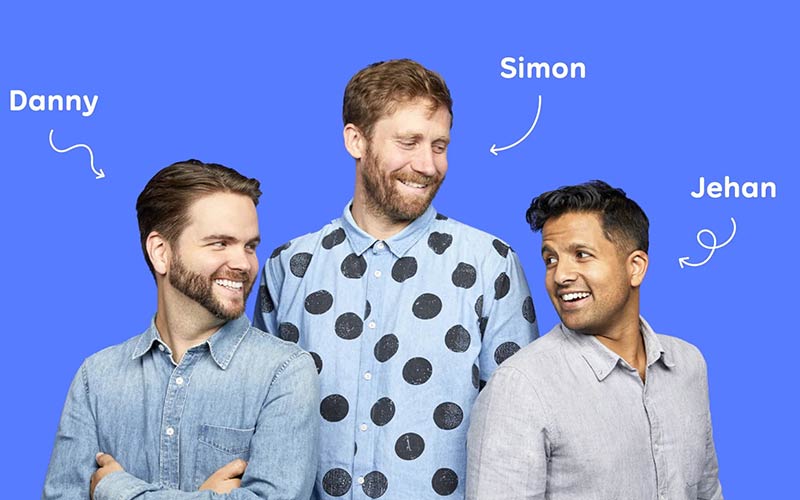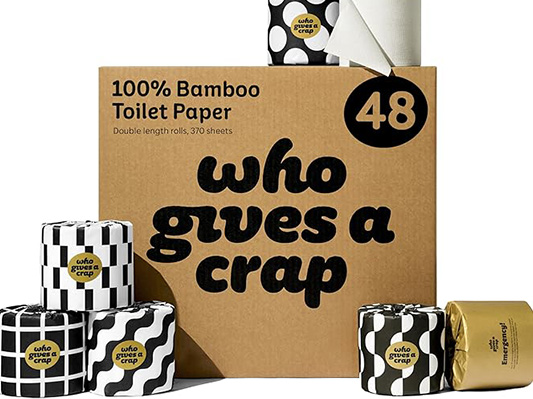Who Gives A Crap is a great company. 50% their profits are donated to clean water and sanitation non-profits. Their toilet paper products are made from 100% recycled paper or bamboo, making them an eco-friendly alternative to traditional toilet paper. Here is a brief history about this company.
Who Gives A Crap company
Who Gives A Crap (WGAC) was founded in 2012 by Simon Griffiths, Danny Alexander, and Jehan Ratnatunga in Australia. They started Who Gives A Crap when they learnt that 2.4 billion people don't have access to a toilet. That's roughly 40% of the global population and means that around 289,000 children under five die every year from diarrheal diseases caused by poor water and sanitation. That's almost 800 children per day, or one child every two minutes.

Source: https://us.whogivesacrap.org/pages/about-us
They delivered their first product in March 2013 and have been thrilled to keep growing ever since. Not just because their toilet paper is gracing bathrooms across the country but also because they donate 50% of their profits to help build toilets and improve sanitation in the developing world. They are a great company.
Who Gives A Crap toilet paper is created from recycled paper, and each roll is also individually wrapped in recycled paper. Since 2016, they also sell toilet paper created from bamboo, which is manufactured in China.
By 2020, Who Gives A Crap had grown to about 100 staff, and shipped products to 36 countries, with warehouses in Australia, the United Kingdom, the United States, and the Netherlands.
Who Gives A Crap phone number
(212) 615-3585
Collins St, Melbourne, Victoria 3000, AU
Who Gives A Crap login
https://us.whogivesacrap.org/account
Who Gives A Crap toilet paper review
Bamboo toilet paper
Bamboo toilet paper rolls aren't made with trees. They are made from 100% renewable and sustainable bamboo. They contain natural ingredients with no fragrance. No dye, bleach or chemicals. It's biodegradable and plays well with most septic tanks. No more worries about skin irritation or sensitivity. Ultra-soft and strong toilet paper can provide a comfortable, reliable clean that you can count on. The bamboo paper toilet rolls are a premium choice for softness, strength, and quality.
https://www.amazon.com/Who-Gives-Crap-Biodegradable-Plastic-Free/dp/B07MRF76N3
BIODEGRADABLE BAMBOO TOILET PAPER: Our fanciest toilet paper rolls are luxuriously soft and ultra-strong, and made with extra cushy double length 3 ply rolls. Who Gives A Crap bathroom tissue is also biodegradable and plays well with most septic tanks!
3 PLY SOFT TOILET PAPER: Our extra cushy bath tissue might feel a bit different since, well, it is a bit different. Unlike most blanket-like mainstream TP, these rolls aren't made with trees. They're soft and strong like regular toilet paper, but feel much better on your conscience.
100% BAMBOO FIBERS: Every day, over 1 million trees are cut down to make traditional toilet paper. We're not so keen on killing trees just to make TP, which is why these rolls are made with 100% bamboo fibers.
RENEWABLE and SUSTAINABLE: A lot of people don't realize that bamboo is a grass, not a tree. It grows incredibly quickly, making it a sustainable source for bathroom rolls. You can wipe easy knowing that you're helping to reduce deforestation one flush at a time with our bathroom tissue toilet paper.
Recycled toilet paper
Recycled toilet paper is made from waste paper, like newspaper, notebooks, that has been collected and processed to create new toilet paper products. Using recycled paper products is a simple and effective way to reduce waste and help protect the environment.
This 100% recycled toilet paper is the eco-friendliest.
Who Gives A Crap paper towels
The Who Gives A Crap paper towels are super absorbent and are made from 100% recycled paper. They're 2 ply and feature adjustable sheet sizes, so you can choose the right amount for the job every time.
Is Who Gives A Crap septic safe?
The Who Gives A Crap toilet paper is septic safe. They don't use any chlorine, inks, dyes or weird perfumes in the toilet paper. They just pulp the clean fibers at super high temperatures to make WGAC biodegradable, safe in septic tanks and as strong as it is silky soft. And since it's only tested on the finest human bottoms, our toilet paper is as good for your bum as it is for the planet.
But can you flush paper towel? The answer is not. Paper contains two types: short fiber and long fiber. Short fibers are more easily dissolved by water, while long fibers are less likely to decompose. Paper towel contains a lot of long fibers added. So paper towel generally cannot dissolve or shrink in water like other tissues, it is easy to get stuck in the sink bend of the toilet, causing toilet blockage. So it's best to throw these paper towels directly into the trash can.
Does Who Gives A Crap really build toilets?
Yes, Who Gives A Crap really build toilets. They donate 50% of their profits to building scalable and sustainable toilet solutions. However, they do not physically build the toilets themselves. They partner with amazing organizations that work with local communities to build sustainable and scalable solutions. Their mission is to help everyone in the world have access to a toilet as quickly and as sustainably as possible.
Where is who gives a crap toilet paper made?
After a lot (and we mean A LOT) of thoughtful consideration, we've proudly set up the majority of our manufacturing operations in China. There's a bit of a misconception about production in China, which we think is important to address. We work closely with our producers to ensure standards and processes we’re happy with, plus we found that China offered a lot of wonderful benefits:
We can use paper wrappers and recycled cardboard boxes rather than plastic! We couldn't find a local producer that would let us do this with varied designs for our wrappers.
We have access to a large pool of local, raw materials– both post-consumer waste paper and bamboo (neither of which is readily available in the majority of our markets). By using China's local materials, we avoid importing from overseas.
We can cut the cost of operations, passing on those savings to our customers.


